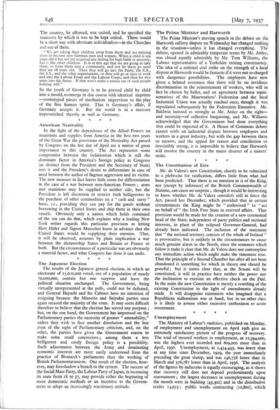The Japanese Election The results of the Japanese general election,
in which an electorate of 15,coo,000 voted, out of a population of nearly 70,000,000, contain but one surprise and leave the political situation unchanged. The Government, being virtually unrepresented at the polls, could not be defeated, and General Hayashi and his Cabinet have no intention of resigning because the lvtinseito and Seiyukai parties once again secured the majority of the votes. It may seem difficult therefore to believe that the election has served any purpose ; but, on the one hand, the Government has impressed on the Parliamentary parties the necessity of greater "amenability," unless they wish to face another dissolution and the loss even of the right of Parliameniary criticism, and, on the other, the parties have given the Government reason to make some small concessions ; among them a less belligerent and costly foreign policy is a possibility. Such adjustments between the Army and dominating economic interests are more easily understood from the practice of Bismarck's parliaments than the working of British Parliamentarianism One result of the election, how. ever, may foreshadow a breach in the system. The success of the Social Mass Party, the Labour Party of Japan, in increasing its seats from 18 to 37, may provide either the beginning of more democratic methods or an incentive to the Govern- ment to adopt an increasingly reactionary attitude.














































 Previous page
Previous page